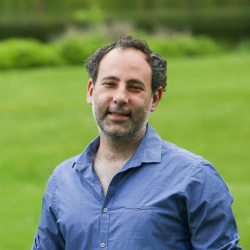Startup Star to Speak at 2023 CMNS Undergraduate Commencement Ceremony
Zeki Mokhtarzada (B.S. ’01, computer science and mathematics) and his brothers built two successful tech ventures and launched a startup incubator at UMD
When Zeki Mokhtarzada (B.S. ’01, computer science and mathematics) delivers his commencement speech to undergraduates this May at the University of Maryland’s College of Computer, Mathematical, and Natural Sciences, he’ll be speaking from a wealth of experience—and UMD memories. His own graduation 22 years ago was more than special. Two of his siblings also received their degrees from Maryland that day, but that commencement event—or more accurately, the moment he snuck out of it—marked the start of Mokhtarzada’s hugely successful career as a tech entrepreneur.

"I remember my brother Haroon and I snuck out of graduation to go over to the Skinner building—they had open computers there—so we could check the numbers for our new company Freewebs,” Mokhtarzada recalled. “We’d just launched a week before that and when we checked the sign-ups, we realized we had 34 users that day. That was actually the moment we realized, ‘Oh my God, this is going to be a big business—34 people signed up, this is gonna be huge!’”
And it was. In the years that followed, Zeki and his brothers climbed the charts to superstar status in the tech startup world. By 2011, they sold their College Park startup Freewebs (later renamed Webs, Inc.) to VistaPrint for a cool $117.5 million. Then in 2021, Rocket Companies snagged the Mokhtarzada brothers’ next venture, the multimillion-dollar subscription management app Truebill, for $1.275 billion. (It has since been rebranded as Rocket Money.)
Now, with years of experience as an entrepreneur, consultant and tech advisor, Mokhtarzada serves as chief technology officer for Tenovos, a New York-based startup leading in next-generation digital asset management. He’s also a familiar face on the UMD campus as a mentor and advisor for student entrepreneurs, through the Dingman Center for Entrepreneurship and his family’s own startup incubator called the Mokhtarzada Hatchery. For Mokhtarzada, working with the UMD startup community is all about giving back.
“To me, it’s just a way to pay it forward,” he explained. “It’s a way to show my gratitude for all the people who helped me along the way.”
Programming computers—in elementary school
Born in Turkey, Mokhtarzada spent the first years of his life in Afghanistan. When he was five, his family fled from the turmoil of the Soviet invasion and came to the U.S. as refugees, settling down in Montgomery County, Maryland. By the time Mokhtarzada was in elementary school, his parents had started a home-based business and his father encouraged him to start experimenting with computers.
“We had computers in our house before most people did—it was part of the office—so I learned a lot about office computing through that experience,” Mokhtarzada recalled. “We had this big IBM PC with two floppy drives, and my dad said, ‘Hey why don’t you learn to program this thing.’ So, I was pretty much self-taught.”
Mokhtarzada’s interest in computers and programming grew, and by the time he finished 10th grade, he was taking college-level courses at UMD.
“We connected with Dr. John Gannon, who was the department chair at the time, and he became a mentor for me,” Mokhtarzada said. “I started taking classes at Maryland that summer and again the summer of 11th grade and then 12th grade I did dual enrollment, half the day I was at high school and then I was at the University of Maryland taking classes.”
When it was time for college, Maryland was the obvious choice. Mokhtarzada spent his college years building a strong skill set for the next-generation tech he wanted to create.
“At Maryland, that’s really where I learned how to code and design programs and how data structures work, how databases work, how the machine architecture itself works,” he explained. “It gave me a really strong foundation, skills I still use today.”
Dropping out—and rushing back
In 1999, Mokhtarzada dropped out of college to join a startup called HyperOffice, gaining valuable expertise in web development along the way. But when dot-coms started going bust, so did the job. Mokhtarzada knew what he had to do.
“I remember I didn’t waste any time,” he recalled. “I got laid off at like 10 in the morning and I went straight to the Mitchell building and I told them ‘I have a couple missing credits I need to finish.’”
By the time he graduated in 2001, Mokhtarzada had picked up a second major in mathematics. He went all in with his brothers as they grew and sold their first startup Webs, Inc. and then brainstormed and built the blockbuster personal finance app Truebill. For Mokhtarzada and his brothers, it was a rollercoaster ride to startup success.
“I think I gravitate toward those early days, that’s kind of the sweet spot,” he reflected. “Once you’ve got customers it’s just so exhilarating because you’ve got someone using your product and you’re so motivated because there are people counting on you.”
In 2016, when startup accelerator Y Combinator invested in Truebill and made a commitment to help the company grow, Mokhtarzada’s brothers Haroon, Idris and Yahya headed for the West Coast to take advantage of the opportunity. But Zeki decided to stay in Maryland and apply his entrepreneurial experience as a consultant to the startup community. By 2019, he joined Tenovos as chief technology officer, helping to build the business, one step at a time.
“What I like about this, and startups in general, is you get to build a team piece by piece, you get to build processes, you get to look at what’s working and what’s not working and make drastic changes because the company isn’t huge, there’s not a lot of bureaucracy,” Mokhtarzada explained. “We can all can get in a room and say, ‘Hey guys, let’s change the way we work,’ and then do it, and I really like that.”
Putting Maryland tech on the map
Through his work with startups and his commitment to mentoring students in programs like the Dingman Center and the Hatchery, Mokhtarzada hopes to advance an even bigger mission—putting Maryland on the map as a powerhouse tech ecosystem.
“We have so much going for this area, there’s no reason why we don’t have a stronger tech hub here, specifically in Maryland,” he noted. “There’s no reason why we shouldn’t be competing on a high level.”
Mokhtarzada also devotes as much time as he can to working with local and national nonprofits.
“I think that’s part of giving back and being a productive member of society,” he said. “I’m the president of the Montgomery Blair High School Magnet Foundation and we help by paying for programs that are no longer available because of budget cuts, things like lab equipment and teacher training. I’m also the treasurer of the One America Movement and we’re addressing toxic polarization in America, bringing groups of people together who typically wouldn’t interact with one another.”
Of all the things Mokhtarzada does to pay his own success forward, his work with student entrepreneurs is especially rewarding, a very real reminder of just how far he’s come.
“I definitely love interacting with those kids and remembering where I was when I was at Maryland myself—and that’s energizing as well,” he explained. “These students are so with it, so impressive with what they’re doing that I kind of wish I’d spent my time as intentionally as they do. For me, it was more about luck, and I happened to be at the right place at the right time.”
Now, as Mokhtarzada looks ahead to his speech at this year’s commencement ceremony, he hopes his success story can inspire the class of 2023 to make their own mark on the world, in whatever way they can.
"It's an exciting time to be alive and I look forward to sharing my experiences and lessons learned,” he said. “I hope that I can inspire the graduates to build the future they want to live in."







